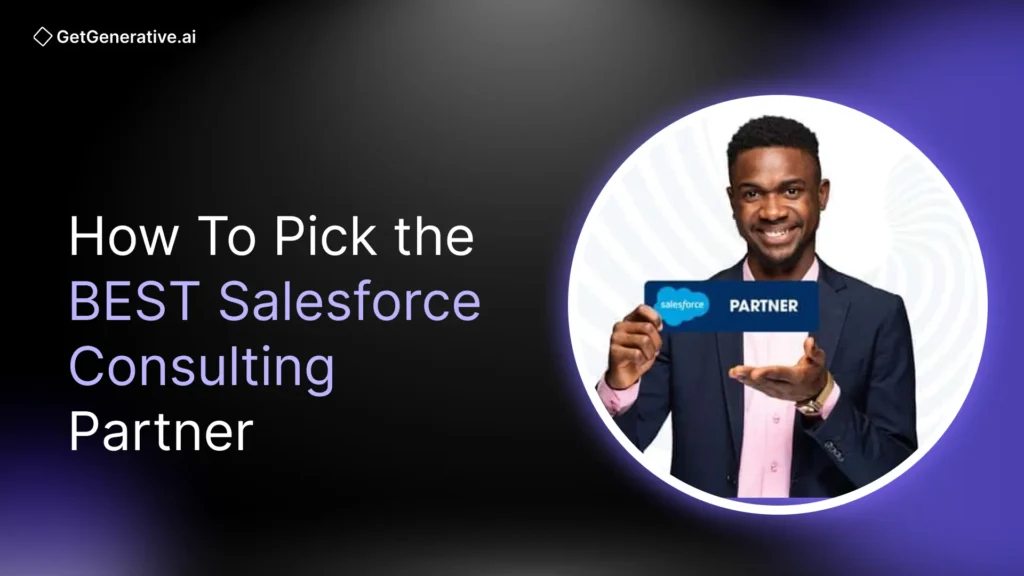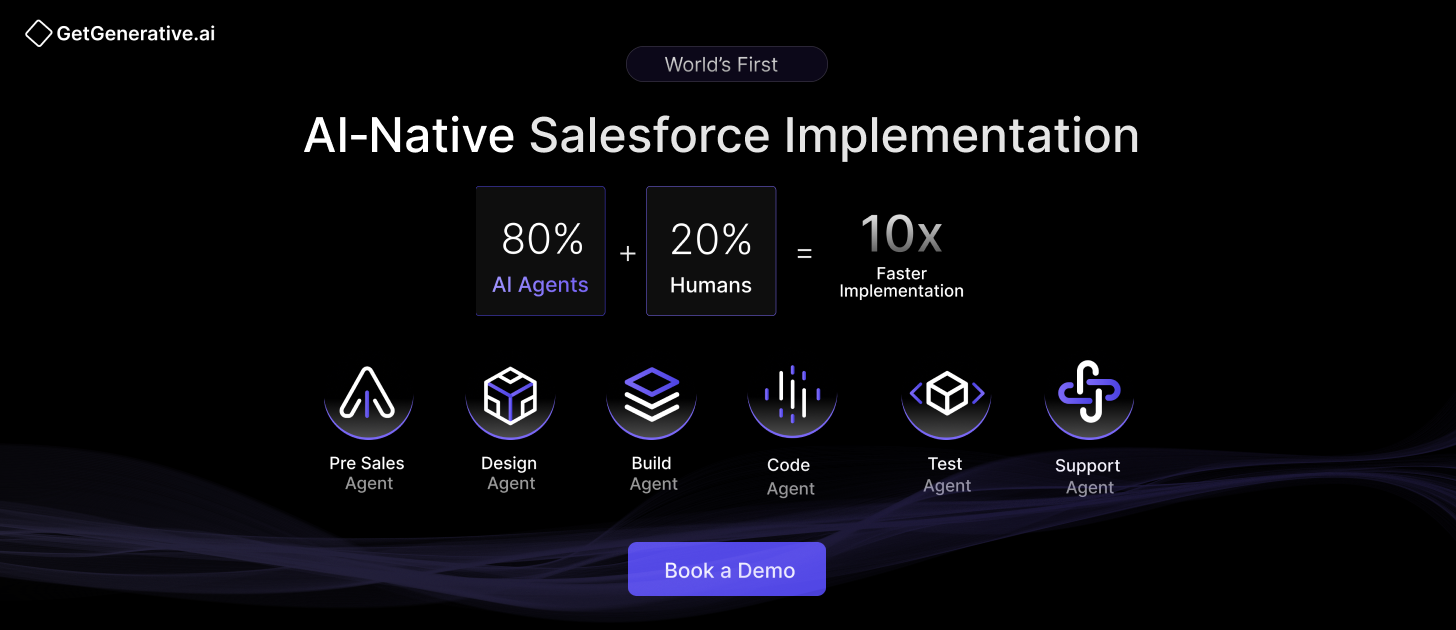How To Pick the BEST Salesforce Consulting Partner
The choice of implementation partner often determines whether your investment becomes a catalyst for digital transformation or a costly misstep.
A wrong decision can lead to budget overruns, extended delays, and poor user adoption. The right partner, on the other hand, serves as a strategic extension of your team, accelerating time-to-value and ensuring your organization captures the full potential of its Salesforce investment.
This guide provides a strategic framework to help you navigate the complex partner selection process and secure a consulting partner that drives long-term business success.
Importance of having the Right Salesforce Partner
Financial Impact and Risk Mitigation
Salesforce implementations can range from $10,000 for basic deployments to over $500,000 for complex enterprise rollouts. But the total cost of ownership extends far beyond upfront partner fees.
The risks of poor partner selection are significant:
- 25–50% budget overruns
- Extended project delays
- Accumulated technical debt has hindered innovation for years
By contrast, research shows that well-executed implementations deliver an average ROI of 29% within just nine months. Conversely, failed projects can result in millions of dollars lost to low adoption, wasted effort, and delayed competitive advantage.
Time-to-Value Considerations
The speed at which your organization realizes Salesforce’s benefits is another critical factor.
- Small business projects: 2–8 weeks
- Mid-sized projects: 8–16 weeks
- Enterprise implementations: 24–52 weeks
On average, it takes 13 months to achieve positive ROI, but the right partner can accelerate delivery by up to 78% using proven methodologies, pre-built accelerators, and reusable components.
Faster implementations mean faster competitive advantage, often the difference between leading or lagging in your market.
Also Read – Challenges In Salesforce Consulting Projects
Essential Evaluation Criteria for Choosing a Partner
1. Industry-Specific Experience and Domain Knowledge
Industry experience is the top selection factor, rated 95% in importance by successful implementations.
Partners with deep vertical knowledge bring:
- Pre-configured solutions tailored to industry processes
- Regulatory and compliance expertise
- Domain accelerators that shorten timelines
For example, healthcare, financial services, and manufacturing firms report 25–40% faster implementations with industry-specialized partners.
Key questions to ask:
- How many projects has the partner delivered in your industry?
- Can they demonstrate knowledge of compliance requirements?
- Do they maintain pre-built solutions for your sector?
- What percentage of their consultants have domain expertise?
2. Technical Certifications and Platform Expertise
Technical certifications rank 90% in importance, making them critical indicators of competency.
Not all certifications are equal:
- Core: Administrator, Developer, Architect
- Advanced: Einstein AI, Integration Architecture, Industry Clouds
Leading partners maintain certification ratios of 35%+ across their workforce and continuously invest in training. Executives should also validate the relevance and recency of certifications to ensure alignment with project requirements.
Key certifications to prioritize:
- Salesforce Certified Technical Architect (expert level)
- Platform Developer II (advanced coding)
- Integration Architecture (system connectivity)
- Industry Cloud Consultant (vertical specialization)
3. Project Management Methodology and Delivery Framework
A partner’s delivery framework can make or break your implementation.
- 85% of successful projects are linked to structured project management
- Agile methodologies with defined sprints, stakeholder protocols, and change management are standard among top partners
- Organizations using such partners report 53% higher satisfaction and 47% greater likelihood of meeting business objectives
Evaluation checkpoints:
- Sprint planning and backlog management
- Stakeholder reporting cadence
- Risk mitigation strategies
- QA and testing frameworks
- Change management and adoption planning
4. Cultural Fit and Communication Alignment
While sometimes overlooked, cultural fit is rated 80% in importance. Misaligned partnerships can create friction, delays, and miscommunication.
Strong cultural alignment indicators include:
- Proactive vs. reactive communication
- Collaborative problem-solving
- Transparency in issue reporting
- Shared values and ethics
Executives should evaluate cultural compatibility during early discussions to avoid long-term friction.
Critical Red Flags and Warning Signs
1. Communication and Transparency Issues
Poor communication is the number one red flag in partner relationships.
Warning signs include:
- Irregular updates or vague reporting
- Reluctance to provide documentation or project artifacts
- Difficulty scheduling stakeholder meetings
- Language barriers that hinder collaboration
A “if you don’t ask, we won’t tell” approach almost always leads to downstream project failures.
2. Overpromising and Unrealistic Commitments
Some partners may promise fast timelines or guaranteed ROI without a full discovery process. This often signals inexperience or aggressive sales tactics.
Be wary of partners who:
- Offer one-size-fits-all solutions
- Guarantee specific ROI outcomes without baselines
- Avoid detailed estimates or change control processes
3. Offshore Resource Dependencies
While offshore models can lower costs, they also introduce risks. Industry data shows that many “rescue projects” originate from offshore implementations with poor oversight.
Red flags include:
- Lack of onshore project management
- Misaligned time zones and communication delays
- Inconsistent documentation and QA
- Limited access to senior technical resources
4. Limited Reference Availability
A reputable partner should have ample references from recent, similar projects.
Be cautious if references are:
- Unavailable or restricted
- Outdated (older than 18 months)
- Irrelevant to your industry or scope
Structured reference checks should include both business and technical stakeholders.
Also Read – From People-First Delivery to the AI Factory in Salesforce Consulting
Financial Considerations and Investment Planning
Understanding Total Cost of Ownership (TCO)
Implementation costs extend beyond partner fees. A TCO analysis typically includes:
- Software licenses – 35%
- Implementation services – 30%
- Data migration – 15%
- Training & adoption – 10%
- Integration – 7%
- Ongoing support – 3%
Typical investment ranges:
- Small business: $25,000–$75,000
- Mid-sized enterprises: $100,000–$300,000
- Large enterprises: $500,000+ for multi-cloud
Pricing Models and Engagement Structures
Partners usually operate under three models:
1. Fixed-Price Projects
- Predictable but rigid for scope changes
- 30–50% upfront, milestone-based releases
2. Time and Materials
- Flexible but requires strong internal governance
- Rates range from $90 to $300/hour, depending on seniority and geography
3. Retainer Engagements
- Best for ongoing optimization and support
- Monthly fees: $5,000–$25,000
ROI Expectations and Timelines
Well-executed implementations should deliver positive ROI in 12–15 months, with leading projects showing measurable gains in 3–6 months.
Key ROI drivers include:
- 25–40% faster sales cycles through automation
- 25–32% improved forecast accuracy
- 30–50% reduction in case resolution times
- 15–25% improvement in marketing effectiveness
The Partner Evaluation Process
Structured Assessment Framework
A five-stage evaluation framework ensures balanced decision-making:
- Strategic Goal Definition – set objectives, success metrics, and constraints
- Technical Capability Assessment – validate certifications, methodology, and accelerators
- Cultural & Communication Fit – interview potential project teams
- Reference Validation – case studies, financial stability, recent engagements
- Commercial Negotiation – scope, SLAs, IP ownership, and data security
RFP Best Practices
An effective RFP should balance comprehensiveness with clarity.
Must-have components:
- Executive summary & objectives
- Current-state gaps
- Functional & technical requirements
- Integration & data migration scope
- Budget parameters & pricing preferences
- Weighted evaluation criteria
Reference Interview Protocols
Reference checks should go beyond surface-level satisfaction.
Ask questions like:
- How did the partner handle scope changes?
- Was communication proactive?
- Did they meet timelines and budgets?
- How effective was training and adoption?
- Would you rehire them?
Also Read – The Future of Salesforce Consulting: From Siloed Teams to Agile Human–Agent Pods
Building Long-Term Strategic Partnerships
Beyond Implementation
A successful Salesforce journey doesn’t end at go-live. Leading partners provide continuous support and optimization, ensuring long-term ROI.
Critical ongoing services include:
- Maintenance & technical support
- Training & adoption programs
- New feature rollouts from Salesforce’s tri-annual releases
- Performance optimization
- Roadmap planning
Organizations that invest in long-term partnerships report 40% higher satisfaction and significantly better platform utilization.
Innovation and Continuous Improvement
Salesforce evolves rapidly, with three major releases each year. Strategic partners ensure organizations stay ahead by:
- Running pilot programs for new features
- Holding regular roadmap sessions
- Benchmarking against industry best practices
- Delivering thought leadership
Firms with proactive partners achieve 25–30% higher platform utilization and realize benefits from new features faster than peers.
Conclusion
With 89% of organizations achieving positive ROI from well-executed Salesforce projects, the platform’s value is proven. The difference lies in choosing the right partner – one that aligns with your goals, mitigates risks, and drives a sustainable competitive advantage.
At GetGenerative.ai, we’ve reimagined Salesforce implementation—built from the ground up with AI at the core. This isn’t legacy delivery with AI added on. It’s a faster, smarter, AI-native approach powered by our proprietary platform.
👉 Explore our Salesforce AI consulting services




